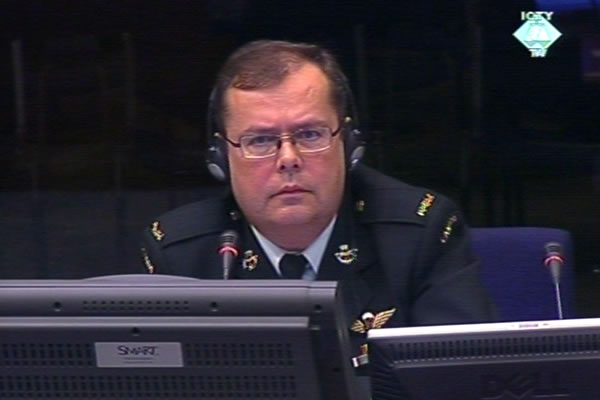Home
UN IN BOSNIA ‘A WARRING SIDE, NOT PEACE-KEEPING FORCE’
Canadian Patrick Rechner testifies at the trial of Radovan Karadzic. Together with 200 other UN military observers and UN peace-keepers, Rechner was arrested in May 1995 and used as a human shield against NATO air strikes. Karadzic tried to prove that in Bosnia the UN was a ‘warring side, not a peace-keeping force’
 Patrick Rechner, witness at the Radovan Karadzic trial
Patrick Rechner, witness at the Radovan Karadzic trial The trial of Radovan Karadzic continued with the evidence of Canadian Patrick Rechner. In May and June 1995, the Serb forces held Rechner hostage and used him as a human shield against NATO air strikes. At the time of the hostage crisis, the witness headed a team of UN military observers in Pale. Their main task was to supervise the ceasefire agreements and to maintain contacts with the Bosnian Serb political and military leadership.
The witness and two other members of his team were arrested on 26 May 1995. Threats were made that they would be killed if NATO didn’t stop the air strikes on Serb military targets. The observers were first taken to Jahorinski potok, where the VRS had an ammunition depot that had already been hit by NATO airplanes.
The observers were handcuffed to a lightning rod and the warehouse door. A Serb lieutenant-colonel approached them and filmed them, telling them that if they did not get killed by air strikes, he would personally kill them. The lieutenant-colonel showed them two cuts on the handle of his gun. That meant that he had already killed twice. The lieutenant-colonel told the observers he would like to add three more cuts to his tally.
Nicholas Ribic, a Canadian of Serb origin who fought in the VRS reiterated the same threat several times on the first day of the witness’s captivity in Pale: the captives will be killed in NATO continues with the air strikes. The Canadian Federal Court sentenced Ribic to three years in prison for terrorism and hostage taking for his part in the events in May and June 1995. Rechner also testified at that trial.
During his captivity in Pale, Rechner was treated in a similar way as Polish officer Janusz Kalbarczyk and Dutch officer Marcus Helgers. In their evidence last week, Kalbarczyk and Helgers recounted how the Serb forces held them in an area close to military facilities that were likely to be targeted by NATO.
In the cross-examination, Karadzic reminded the court of his warnings in May 1995, when he said that if there were NATO air strikes, the UN peace-keepers would be considered ‘a warring side’. Karadzic insisted that the Serb side considered the UN members ‘prisoners of war’ because of this, and not ‘hostages’. The accused tried to prove that the captured UN members were treated accordingly.
The witness disagreed with Karadzic’s claim that the Serb forces had complied with all the demands made by the captured UN peace-keepers. According to the witness, the observers’ demands to be seen by a doctor and the Red Cross representatives and to be allowed to make phone calls to their families were complied with – but only after they spent some time in captivity. The witness also rejected Karadzic’s claim that the military observers acted as spotters for NATO airplanes.
Karadzic filed a formal motion to suspend his trial for three months for the fourth time before the prosecution starts calling evidence on the ethnic cleansing in the municipalities listed in the indictment. He claims he needs time to go through 32,000 pages of documents and 200 hours of video material that is potentially exculpatory evidence. Karadzic maintains that the prosecution has disclosed the evidence to him with delay. The Trial Chamber urged the prosecution to reply to the motion of the accused as soon as possible.
Linked Reports
- Case : Karadzic
- 2011-02-01 KARADZIC: INVESTIGATIONS WERE DONE USING STICKS AND PIECES OF STRING
- 2011-01-31 KARADZIC CONTESTS VALIDITY OF SARAJEVO INVESTIGATIONS
- 2011-01-31 KARADZIC DEMANDS PRIVACY PROTECTION
- 2011-02-03 ‘MAPPING’ THE SNIPER TERROR CAMPAIGN IN SARAJEVO
- 2011-02-08 GENERAL RUPERT SMITH: ‘KARADZIC OUT OF TOUCH WITH WORLD’
- 2011-02-09 MLADIC’S INTENTIONS IN SREBRENICA WERE MISREAD
